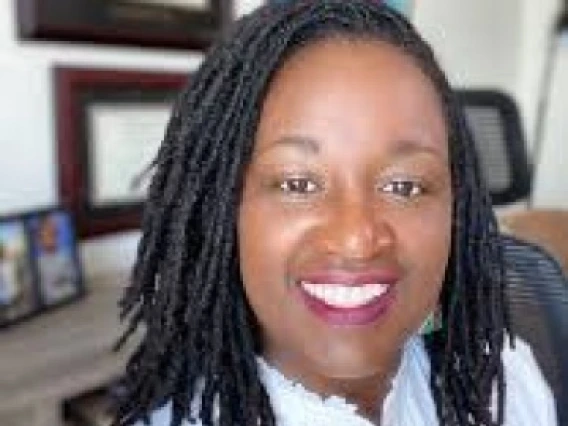
Digital technology use has led to a new diversity in Black religious life, starting before but accelerating during the COVID-19 pandemic, with changes in both beliefs and practices, according to a new study.
The Connected Faith Survey, to be released this week, is the first study to explicitly explore the association between digital technology use and Black religious life. Based on online surveys and interviews with 400 participants in 2022 and 2023, the study reveals a new fluidity in faith for Black Americans, who’ve used podcasts, YouTube, Facebook, Twitter, TikTok and more to create and sustain meaningful religious communities, said Erika Gault, the study’s principal investigator.
“Black people are not contained to the Black Church,” said Gault, Associate Professor of Africana Studies at the University of Arizona. “Digital technology has facilitated the emergence of those best described as Christian + or Faith Fluid, those who identify as Christian while openly embracing other religions and religious practices or those who move across or borrow from multiple faith expressions. People have a lot more options when they are not going to churches, synagogues or mosques at certain times each week.”
To date, most studies that have examined Black religion, or even the relationship between technology and religion, have focused on church attendance, physical houses of worship, rituals or personal beliefs and have largely studied particular religious communities. But Gault’s study instead centered on the digital spaces themselves and covered diverse religious and spiritual practices by using both quantitative and qualitative measures.
“Religion, and thus studies of religion, are still quite siloed in the minds of many. However, this report suggests that that’s not quite the case when a digital lens is used to study religion. Black religion is diverse. Digital technology, particularly post-COVID, has made room for that diversity, explicitly so,” she said.
Since the start of online messaging and social media, people’s digital lives have been interwoven with their religious beliefs and practices in a myriad of ways, but the physical isolation of COVID-19, as well as concurrent social activism related to Black Lives Matter, both deepened and broadened various trends, Gault said.
“All of these things were happening before and there were a number of people who were participating in religion digitally, but the acceleration of these practices on a wide scale and people articulating them for what they were happened in the pandemic,” she said. “Facebook groups and Instagram lives were important for some people, operating pretty much like houses of worship. It was where they gathered to have spiritual encounters. That was church for them and community for them as they participated in religious discourse and learned from each other.”
Whether on Facebook, Twitter or YouTube, participation in replies and comments cannot be discounted, Gault said, opening ways for individuals to actively join discussions and engage with others.
“The way you might say ‘Amen’ in a church service, they were talking back and felt like they were part of a community and had transformative encounters in the comments section,” she said. “In some ways were talking about something that’s totally new and transformative about the way people engage with religion. In other ways, it’s what people have always done and digital technology is just mediating that.”
Previous studies have pointed to some similar trends relating to Americans’ religious beliefs, but Gault’s survey took a different approach, focusing on individuals rather than starting from the perspective of organized religions and spiritual leaders.
“This is the first survey that’s asked these questions and gotten to the answers this way. People who are in positions of authority answer questions quite differently than people who sit on the back pew or those whose faith needs no pew” she said. “We got a more thorough understanding of what the average person is thinking about religion vs. what the person in charge says religion is for them. From the CFS report, we now know life satisfaction is down among the highest users of digital technology. Yet, life satisfaction goes up for users of digital technology for religious and spiritual purposes. ”
Gault, who has been studying Black faith and technology use for the past 15 years, started the Connected Faith Survey after completing an ethnographic study into emerging faith practices of Black millennials and a two-year study of the digital lives of six Christian millennials, which became Networking the Black Church: Digital Black Religion and Hip Hop.
The Connected Faith Survey, supported by the National Endowment for the Humanities and Louisville Institute, involved a team of social scientists, web developers, influencers, content creators and religious leaders who designed an approach that itself existed in and took advantage of unique elements of the digital realm.
“Again and again over this two-year process, I’ve been awed and humbled by their insights and passion for revealing and documenting the shape of Black religion at present. I hope we have created a useful tool for researchers and religious practitioners to better understand and discuss faith in the digital,” she said.
Ultimately, the Connected Faith Survey can have potential insights for American religion in a larger context, Gault said.
“What we’re really talking about is a shift overall in American religious beliefs. Black folks are a significant population, but we can also talk about the trends that African Americans create online as an indicator of what all Americans are experiencing regarding religion,” she said. “The more we know about how the digital functions in the religious life of Black Americans the more we understand ‘the next’ in religion in America and across the globe.”
In celebration of Juneteenth, the Connected Faith Survey report goes live on June 19 at www.digitalblackreligionsurvey.com.

